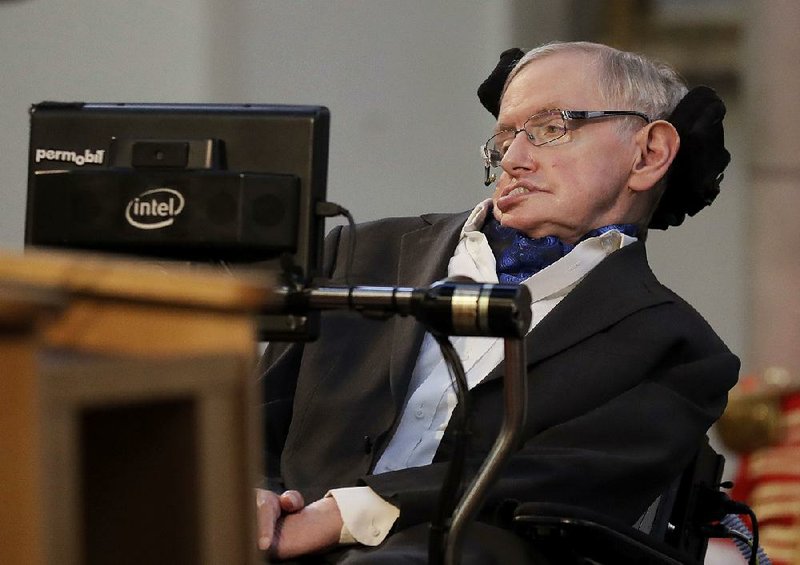LONDON -- Stephen Hawking, the British physicist who brought science to a mass audience even though his body was paralyzed by disease, has died. He was 76.
Hawking died peacefully at his home in Cambridge, England, early today, a spokesman for his family said in an emailed statement.
"He was a great scientist and an extraordinary man whose work and legacy will live on for many years," his children Lucy, Robert and Tim said in the statement. "His courage and persistence with his brilliance and humor inspired people across the world. He once said, 'It would not be much of a universe if it wasn't home to the people you love.' We will miss him forever."
The best-known theoretical physicist of his time, Hawking wrote so lucidly of the mysteries of space, time and black holes that his book, A Brief History of Time, became an international bestseller, making him one of science's biggest celebrities since Albert Einstein.
Hawking was diagnosed at age 21 with amyotrophic lateral sclerosis -- ALS, commonly called Lou Gehrig's disease -- then stunned doctors by living with the normally fatal illness for more than 50 years. He was confined to an electric wheelchair for much of his adult life.
He communicated his ideas through an American-accented speech synthesizer after a lifesaving tracheotomy in 1985 took away his ability to speak.
But he continued his scientific work, appeared on television and married -- twice. Hawking married his first wife, Jane Wilde, in 1965. The couple separated in 1991, and he married his nurse, Elaine Mason, four years later. They divorced in 2007.
"To my colleagues, I'm just another physicist, but to the wider public, I became possibly the best-known scientist in the world," Hawking wrote in his 2013 memoir My Brief History. "This is partly because scientists, apart from Einstein, are not widely known rock stars, and partly because I fit the stereotype of a disabled genius."
For 30 years, Hawking was Cambridge's Lucasian professor of mathematics, a chair once held by Isaac Newton. In that post, Hawking redefined cosmology by proposing that black holes emit radiation and later evaporate. He also showed that the universe had a beginning by describing how Einstein's theory of general relativity eventually breaks down when time and space are traced back to the Big Bang about 13.7 billion years ago.
Hawking was also involved in the search for the great goal of physics -- a "unified theory" to resolve the contradictions between general relativity and quantum mechanics.
"Stephen's remarkable combination of boldness, vision, insight and courage have enabled him to produce ideas that have transformed our understanding of space and time, black holes and the origin of the universe," James Hartle, professor of physics at the University of California, Santa Barbara, said in 2002.
Hawking never won a Nobel Prize in Physics because his theories required observational data. The Nobel Foundation excludes posthumous nominees.
President Barack Obama awarded Hawking the Presidential Medal of Freedom in 2009, the year of his retirement.
Hawking's other popular books included The Universe in a Nutshell (2001), On the Shoulders of Giants (2002), A Briefer History of Time (2005) and The Grand Design (2010).
In 2015, Eddie Redmayne won an Oscar for his portrayal of Hawking in The Theory of Everything, a film about the scientist's life.
Information for this article was contributed by David Henry of Bloomberg News; and by Robert Barr of The Associated Press.
A Section on 03/14/2018

